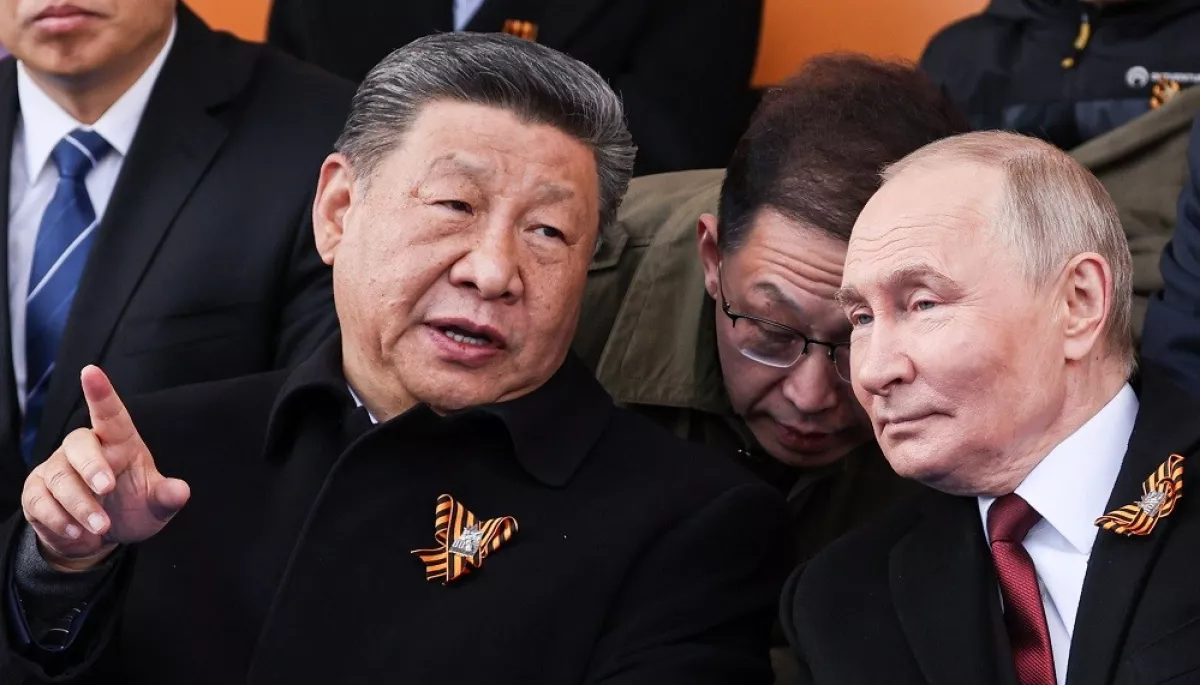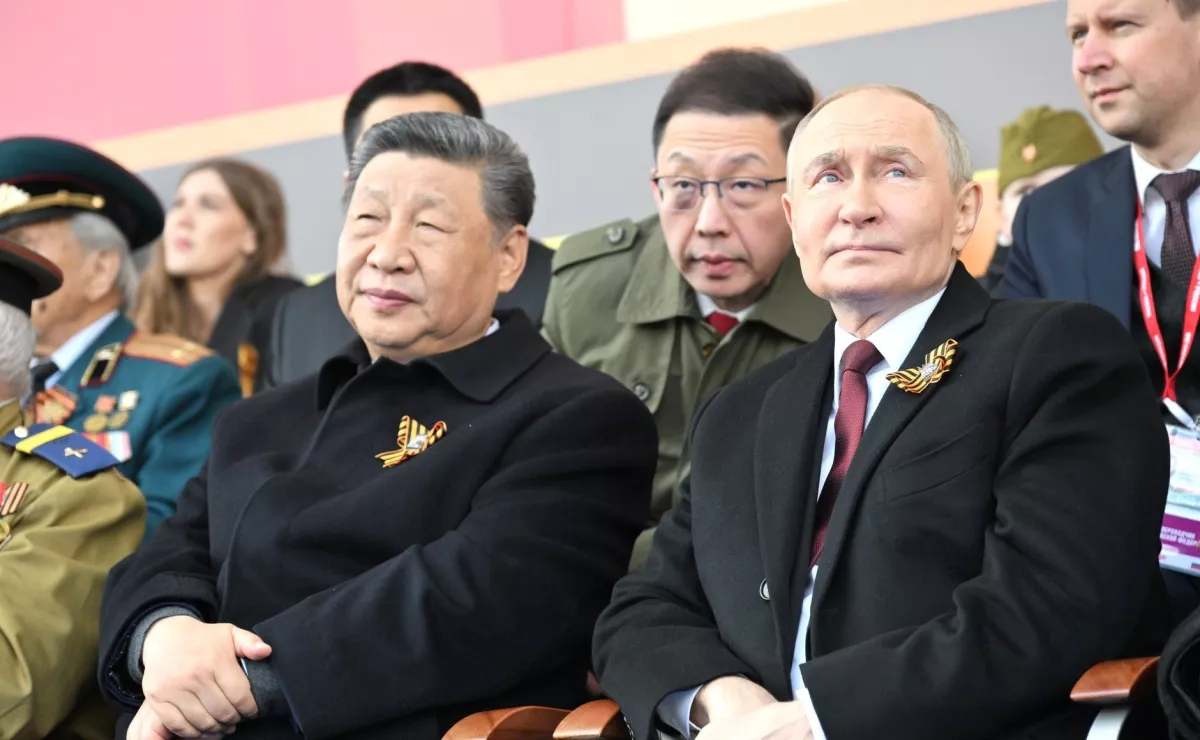The dragon’s shadow on Red Square What Xi’s Moscow visit really meant
One of the most symbolic outcomes of the past week was a clear indication to the entire world of China’s growing global clout. Remarkably, this became evident — however implausible it may seem to some — in part due to the military parade held in Moscow on May 9.
No, the significance does not lie in the parade itself. Rather, it is that, perhaps contrary to the Kremlin’s intended ideological narrative, the central figure of the event turned out to be none other than Chinese President Xi Jinping.
Russian television cameras barely strayed from him. Xi, fully aware of the moment, watched the proceedings in the square with outward calm and restraint, betraying no excess of emotion.
And why would he need to make any excessive gestures, when his very presence in Moscow, first and foremost, signalled China’s independence from any form of blackmail or pressure exerted by external forces?
Secondly, through remarks made by Chinese and Russian leaders in the press statement following their bilateral talks — as well as through several provisions in the signed document “On Further Deepening the Comprehensive Partnership and Strategic Interaction” between China and Russia — Xi Jinping clearly asserted Beijing’s primacy in Sino-Russian relations.
This was evident, above all, in the fact that it was Russian President Vladimir Putin himself who, in parallel with the wording of the joint statement, named China as one of the co-creators of the victory over fascism. Let us acknowledge that Moscow had not previously highlighted this point with such pomp.
Yet this specific emphasis allowed Putin to declare the Moscow-Beijing tandem united and consistent in “preserving the historical truth” of the Second World War “as a shared value for humanity” and in resisting “attempts to falsify history and rehabilitate Nazism and militarism.”
Moreover, it is precisely this “shared heroic past and combat brotherhood” that now serves as a solid foundation “for the development and strengthening of Russian-Chinese relations.”

Following this, Putin expressed satisfaction that China had become Russia’s largest trading partner, with mutual settlements increasingly carried out in rubles and yuan.
The nuance here lies in his emphasis on the growing presence of major Chinese automotive corporations, industrial equipment manufacturers, microelectronics firms, and consumer appliance producers in the Russian market. This includes the implementation of large-scale joint projects in non-ferrous metallurgy, the chemical and pulp-and-paper industries, biotechnology, pharmaceuticals, space exploration, and more.
All of this clearly points to China’s successful and long-term penetration into the Russian market.
Naturally, Xi Jinping expanded on the points voiced by Putin, aligning them with China’s geopolitical interests. He went much further in declaring — albeit alongside Moscow — that Beijing had been one of the “main theatres of military operations during World War II” and had made a “decisive contribution to the victory over fascism.”
However, this assertion went far beyond a mere historical recognition of China’s wartime role. Xi confidently underscored that, in doing so, China and Russia had “laid the cornerstone of the post-war world order.” In light of this, both countries must now resolutely “defend a UN-centred system of international relations and a world order based on international law, while continuously promoting equal and orderly multilateralism across the globe.”
The joint statement by the two sides gave even more concrete expression to Xi Jinping’s narratives, emphasising that “the defeat of Nazi Germany and militarist Japan marked the collapse of the ambitions of those who espoused the inhumane ideology of fascism and sought world domination.” In this context, it stated that both countries “will forever remember the righteous feat of the peoples of the Soviet Union and China, who defended peace on the planet.”
As a result, at the current stage, Beijing and Moscow will continue to “firmly uphold the post-war world order for the sake of building a better future for all humanity,” while opposing “hegemonic ambitions to revise the outcomes of World War II and erode the central role of the UN in maintaining peace and security on a global scale.”
(It is worth noting here that Putin endorsed China’s position in his own remarks, stressing that the UN Security Council must continue to “play a central role in global affairs.”)
By using such wording, the two sides effectively pushed back against calls to reform the system of global governance through the UN Security Council. In doing so, they reinforced Beijing’s assertion that there is no alternative to “building a more just and stable multipolar world order” — a counterweight to actions driven by “hegemonic logic and neocolonial thinking.”
The joint statement thus concluded with an affirmation of the need to defend the international system with the United Nations at its core.
What followed was Moscow’s endorsement of another key narrative promoted by Beijing on the global stage: the recognition of cultural and civilisational diversity, respect for the “unique systems of values of individual states and peoples,” and support for the concept of building a “Community of Common Destiny for Mankind”. At the heart of this concept lies the principle that no one should “ensure their own security at the expense of, or to the detriment of, the security of other states.”
It is fair to say that this particular nuance clearly demonstrated Russia’s full endorsement not merely of China’s foreign policy course, but of China’s broader ideological platform on the international stage.
This support came against the backdrop of the two sides’ firm commitment to further strengthening military and military-technical cooperation — including the expansion of the scope and geographical reach of their joint exercises.
Moscow also backed the inclusion in the Joint Statement of a clause denouncing “illegitimate trade restrictions,” stressing that “the imposition of unjustified tariffs seriously violates the lawful rights and interests of other states and the rules of the WTO.”
In parallel, both Moscow and Beijing condemned the “hegemonic ambitions of certain Western countries and their allies to create quasi-legal mechanisms for exerting pressure on states that pursue an independent foreign policy.”

Thus, through his participation in the Kremlin-organised event on May 9, Xi Jinping skilfully positioned China as a major geopolitical player with its own vision for shaping the world order — one in which Russia appeared as a state accepting Beijing’s rules of the game.
In doing so, Xi indirectly — if not explicitly — sent a message to Washington: that the United States’ anti-China foreign policy stance could accelerate a scenario long feared by two of America’s most prominent strategists, Henry Kissinger and Zbigniew Brzezinski — namely, a geopolitical convergence between Beijing and Moscow.
According to experts, this turn of events was fully anticipated by the Washington administration. That is why, even a week before Xi Jinping’s visit to Moscow, it became public knowledge that U.S.-China negotiations were scheduled to take place in Switzerland on May 10 — precisely the day after the Chinese leader’s trip to Russia. These talks were aimed at discussing tariff policies and exploring possible steps to de-escalate the ongoing trade war.
Following the meeting, U.S. President Donald Trump expressed his hope to see China open up to American business for the benefit of both Beijing and Washington, adding that “great progress” has been made — although he did not elaborate on the specifics.
The world is clearly going through a transitional phase in geopolitics. And we are moving through it alongside it.








